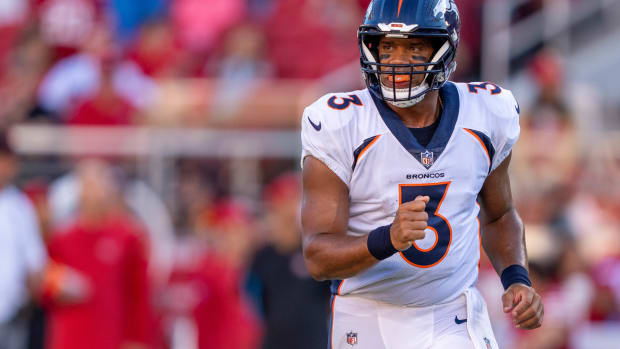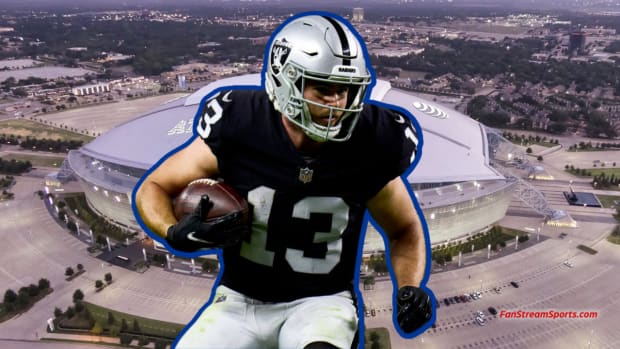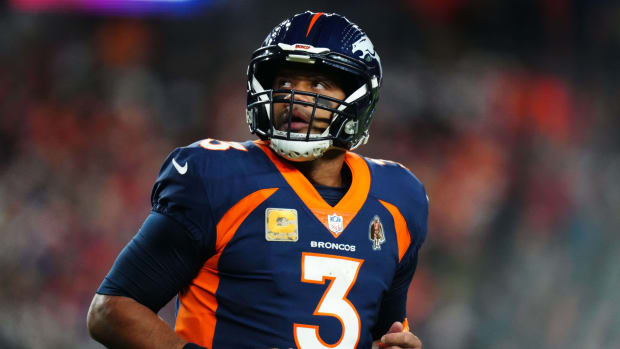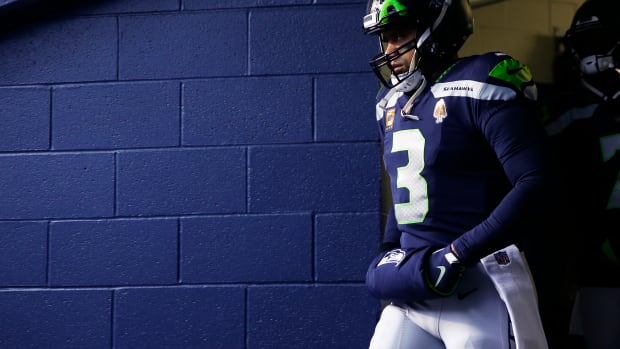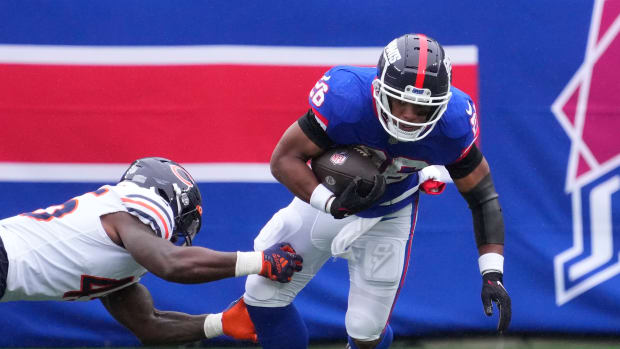Tom Brady could be in trouble after Deflategate appeal hearing
NEW YORK — Fantasy tip: You might want to draft Jimmy Garoppolo for the first four games of the 2016 regular season.
While the Patriots’ backup quarterback played no role in Thursday’s oral arguments of the NFL’s appeal of U.S. District Judge Richard Berman’s Sept. 3 order to vacate Tom Brady’s four-game suspension, he may be a beneficiary of how those arguments are ruled upon. A three-judge panel on the U.S. Court of Appeals for the Second Circuit expressed significant skepticism to the arguments raised by attorney Jeffrey Kessler, who insisted that NFL commissioner Roger Goodell acted outside the scope of his powers in affirming his own suspension of Brady. Judges Robert Katzmann, Barrington Parker, Jr. and Denny Chin took turns in rejecting theories raised by Kessler and—in a surprise—consistently suggested that Brady “destroying” his cell phone provided Goodell sufficient reason to doubt Brady.
The judges also seemed less interested in Judge Berman’s order and accompanying reasoning than in various other Deflategate topics. This in part reflects the de novo standard of appellate review, where the three judges could consider the same set of facts as Judge Berman, focus on different aspects and reach an opposite conclusion. The judges were under no obligation to defer to Judge Berman. If anything, they seemed to ignore him.
Overview of the NFL’s oral argument
Paul Clement, as the attorney arguing for the NFL—the party appealing—went first in Thursday’s oral argument. Clement began his argument by saying that “Article 46 of the collective bargaining agreement gives the commissioner authority” to issue punishments. This is a central point in the NFL’s briefs. After about 10 seconds, however, Judge Katzmann interrupted Clement. Judge Katzmann wasn’t interested in an opening statement that would merely track the NFL’s written briefs. Instead he wondered, “What if the basis of the appeal is new factual findings?”
Katzmann’s opening question was in reference to the issue of whether Goodell changed his rationale for Brady’s four-game suspension between the time the suspension was issued and the time it was sustained upon Brady’s appeal. This is an important point since, as Kessler would later argue, Brady could not have been on notice of new reasons to suspend him. Brady was originally suspended by Goodell based on a conclusion drawn from the Wells Report: It was “more probable than not” that he had general awareness of a football deflation scheme and that he was not fully cooperative. But in Goodell’s decision to uphold his suspension, he referred to different and more damning facts: that Brady participated in a deflation scheme and engaged in willful obstruction.
Track records of judges who’ll decide NFL’s Deflategate appeal
Clement attempted to talk around Judge Katzmann’s question by saying there was no material difference in the rationale for suspension. Judge Chin, seemingly unsatisfied by Clement’s response, wondered whether Brady “should have been given additional notice of the non-cooperation.” Judge Chin highlighted how the NFL’s investigation and subsequent discipline of Brady “started off as a ball tampering proceeding” and morphed into a matter about a destroyed cell phone. Chin asked whether there should have been a separate hearing on the new grounds for suspension. At this point in the hearing, it seemed like Judge Chin and Judge Katzmann were in agreement that the NFL had changed the terms of Brady’s punishment.
Clement was undeterred: “The commissioner didn’t parcel out two games for one [rationale] and two for the other—it was a four-game suspension.” Clement also opined that had “Brady been a more credible witness,” it’s possible Goodell would have reduced the punishment. Clement further reminded the three-judge panel of a sequence of alleged facts involving Brady that Goodell could have been viewed with suspicion. “The day after the story breaks,” Clement recalled, Brady “is in near constant communication with [Patriots employee John] Jastremski,” and Brady and Jastremski “had their first ever meeting in the quarterback room.” Even though appellate hearings are intended to be about law rather than “facts”, Clement used every opportunity to remind the three judges of the parts of the Deflategate timeline that could put Brady in a negative light.
Judge Chin then took over the questioning and again seemed skeptical towards the NFL. As he later did with Kessler, Judge Chin expressed uncertainty over which specific rule the NFL used to punish Brady. Clement stressed the operative penalty stems from the league’s rules on equipment violations, which indicate that the minimum penalty is a fine—by implication, that means a suspension could be allowed. Later, Kessler described Clement as engaging in “complete misdirection” by referring to equipment rules, when in fact the appropriate rules are “game-related player conduct rules,” which Kessler interpreted as only authorizing a fine.
Although he mostly seemed to support the NFL’s case, Judge Parker aggressively challenged Clement on the subject of why Goodell would so harshly punish Brady. “This is a draconian penalty for a few pounds per square inch of air,” Judge Parker said. He also implied the NFL had failed to explain why the inflation level is so critical. After admitting that different quarterbacks like their footballs inflated differently, Clement stressed that air pressure is important because the quarterback impacts every play on offense. Judge Parker didn’t seem persuaded, wondering, “Is there any real advantage?”
Judge Parker’s skepticism about whether slightly underinflated footballs make any appreciable difference was followed by a series of aggressive questions by Judge Katzmann concerning NFL receivers using stickum in contravention of the same rules that Brady allegedly violated. Judge Katzmann pointedly asked Clement about Goodell’s “failure” to explain “the gross disparity between Brady’s punishment” and modest warnings issued over stickum, and whether that failure indicated that Goodell merely delivered “his own brand of industrial justice.” Clement didn’t seem to have a particular compelling response to this question, other than to stress that it was within Goodell’s authority to decide punishments. In other words, even if Goodell’s reasoning may be weak and unpersuasive, it doesn’t matter for purposes of the law. Clement also suggested that stickum may be less meaningful in a football game since wide receivers and tight ends—who are only involved in some plays, rather than all plays like a quarterback—are the main offenders.
Judge Katzmann then wanted Clement to address why Goodell chose to compare Brady’s alleged conduct to use of steroids—a serious health topic with its own intricate rules which also earns a four-game suspension—rather than to stickum, an equipment issue which arguably seems more relevant. Clement again stressed that it was within the commissioner’s authority to make those determinations and doubled back on his point that deflated footballs would influence every play in a way that stickum would not.
Judge Parker then asked a somewhat aggressive question that was at odds with Clement. In calling Goodell “the judge, jury and ... executioner,” Judge Parker wondered whether this unusual arrangement means NFL arbitration is so different from normal arbitration that the high deference judges are expected to show arbitrators may not be in place in the NFL’s case. This question, to me at least, highlighted the fact that Goodell wearing multiple hats in matters of player discipline doesn’t go over well in court, since judges find it bizarre and rife with problems. Clement “respectfully disagree[d]” and argued that the NFL’s system being “unusual”—and thus unfamiliar to judges—is reason to give it more deference rather than less.
Judge Katzmann closed the questioning of Clement by wondering if Goodell could have suspended Brady for a year. Clement responded by saying Goodell could have but wouldn’t have because it would seem “excessive.” Clement further reasoned that Goodell “wants to do what is best for the sport” and his determination of punishments is in accordance with that objective.
Judge Katzmann then asked Clement why “[Katzmann] couldn’t find anything in the Wells Report” that backs up Goodell’s belief that Brady had provided gifts to Patriots employees as inducements. The judge further highlighted the possibility that the gifts may have been a “matter of course” in relationships between players and locker room employees. Clement responded by stating that there was “plenty” in the Wells Report to assume the gifts were inducements. Judge Katzmann didn’t appear convinced. He also inquired about the extent to which Goodell relied on interview reports from Wells’s law firm.
Overview of Brady’s oral argument
After Clement sat down, my instinct was that Brady’s chances looked good. Judges Katzmann, Chin and, to a lesser degree, Parker seemed uncertain, if not doubtful, of Clement’s reasoning on several points. Two attorneys sitting next to me, Alan Milstein and Daniel Wallach, thought the same. Then came Kessler’s argument on behalf of Brady as the appellee.
Kessler stood and then was hit with a question by Judge Chin, who wanted clarity on which rules the NFLPA based its belief that Brady could only have been fined. Judge Chin and Kessler went back and forth over the applicable equipment rule before Judge Parker jumped in to point out he didn’t see anything in equipment rules about footballs. Kessler responded that the NFL was trying to misdirect the three judges into focusing on the wrong rule and the wrong set of accompanying penalties; a schedule of fines was collectively bargained, unlike other aspects of the equipment rules, and only those fines could have been imposed on Brady. Judges Chin and Parker did not appear convinced.
Judge Parker then asked Kessler the first of several hypotheticals designed to undermine Kessler’s argument. What if Goodell was wrong about a scheme to deflate footballs but found Brady untruthful during a hearing and thought Brady destroying his cell phone was an attempt to escape punishment. In that scenario, Judge Parker wondered, shouldn’t Goodell be able to punish Brady for untruthful and dishonest conduct in order to protect the best interest of the game?
Kessler declined to engage the hypothetical too much, instead stressing that Goodell “does not have blanket authority—all the case law makes that clear.” Kessler argued that Goodell should not have been able to change the rationale for the punishment based on information that surfaced during the appeal, after the original set of accusations and accompanying punishments. In Kessler’s view, Brady was effectively denied a right to appeal because his punishment was based on information found during the appeal itself—he would have no right to two appeals.
Judge Parker sat back and seemed completely unconvinced. “This strikes me as hyper-technical,” he said. ”Anybody within 100 yards of this proceeding would have known the cell phone issue raised the stakes.” Judge Parker also criticized Brady, saying “Mr. Brady’s explanation [of the cell phone destruction] made no sense whatsoever.” Kessler tried to rebut that point by referencing the Adrian Peterson case, in which U.S. District Judge David Doty rejected the NFL’s ability to change the rationale for Peterson’s punishment during arbitration.
At that point, Judge Chin jumped in and made a statement that made me believe he would rule against Brady. Judge Chin opined that “the evidence of the ball tampering is compelling, if not overwhelming” before asking why the three-judge panel should “second-guess” the arbitration, meaning Goodell. This question clearly aggravated Kessler, who wondered why there “has been a lot of discussion of the facts” during Thursday’s hearing when such hearings are supposed to focus on questions of law.
Kessler seemed even more annoyed by Judge Parker’s next hypothetical centered on whether the commissioner could only issue a modest fine if during the course of arbitration, it turned out that two of the key witnesses were bribed—a clear allusion to the allegation that McNally and Jastremski received gifts from Brady. Even in that scenario, Kessler stressed, it would be unlawful to suspend the player because he would effectively have no right to appeal it.
Shortly thereafter, Judge Chin described the destruction of the cell phone as a “further step” in the ball deflation plot. This was again a disheartening characterization for Kessler, and by implication, for Brady.
Kessler clearly sensed the implication of Judge Chin’s question and struck back. He described Brady’s “destroying” of the phone as a misleading description, since Brady recycles phones regularly for purposes of privacy. Kessler also stressed that Brady turned over all emails and even went to the phone company to obtain all of the numbers he texted and called, and they all matched up with materials Wells already had.
Towards the end of his argument, Kessler was asked an interesting question by Judge Chin: What did Kessler think motivated Goodell? Kessler responded by saying that Goodell “was out to protect the $3 million” spent on the Wells Report . Kessler then reminded the judges that “we still don’t know” why the footballs lost air pressure and then criticized the NFL and its officials for failing to know what the Ideal Gas Law is and for failing to account for the roles of temperature and timing in air pressure measurements.
Michael McCann answers Deflategate questionsPosted by Sports Illustrated on Thursday, March 3, 2016
Legal expert Michael McCann did a live Facebook chat to answer questions about today's Deflategate hearing. Read his story here: http://on.si.com/1TWDUuG
The NFL’s rebuttal
After Kessler sat down, Clement stood up to speak for a few minutes as part of the appellant’s rebuttal. He highlighted that Goodell should only be judged based on the “barely colorable explanation standard” which is extremely deferential to arbitrators. Clement also rejected the relevance of the Adrian Peterson case as a matter still under appellate review by a different federal appeals court.
Next steps and expected outcome
At some point in the coming months, the three-judge panel will issue an order. Judge Katzmann signaled it might come sooner than later by stating, “this is an expeditious court.”
Based on the judges’ line of questioning on Thursday, Judge Parker seems very inclined to rule for the NFL. Judge Chin mostly seemed to favor the NFL’s perspective, although he also raised serious criticisms of the NFL’s arguments. Judge Katzmann was mostly neutral, although I thought the balance of his comments and questions favored Brady. I expect it will be a 2–1 decision, with higher odds it falls in the NFL’s favor than in the NFLPA’s favor.
A 2–1 ruling in favor of the NFL would have the same force of law as a 3–0 ruling. Kessler and Clement disagreed about the impact of the appellate court reversing Judge Berman’s ruling. Kessler insisted that any reversal should be accompanied by a remand back to Judge Berman. Berman’s order intentionally declined to rule on three alleged missteps by the NFL: whether Goodell was “evidently partial” by delegating his authority to NFL executive vice president Troy Vincent; whether Goodell unlawfully made factual conclusions that were outside the scope of the Wells Report and Brady’s appeal; and whether Goodell expressing support for the Wells Report after its publication prejudiced Brady’s chances for a fair appeal and thus prevented Goodell from lawfully serving as the arbitrator for the appeal.
Clement, in contrast, insisted that the three-judge panel should reverse Judge Berman and order that Brady serve the four-game suspension. Clement said that “it would be an awful shame” for this matter to hang over the NFL and Brady into next season. He urged the three-judge panel to reverse and command that Goodell’s arbitration decision be enforced.
Michael McCann is a legal analyst and writer for Sports Illustrated. He is also a Massachusetts attorney and the founding director of the Sports and Entertainment Law Institute at the University of New Hampshire School of Law. He also created and teaches the Deflategate undergraduate course at UNH, serves as the distinguished visiting Hall of Fame Professor of Law at Mississippi College School of Law and is on the faculty of the Oregon Law Summer Sports Institute.
































